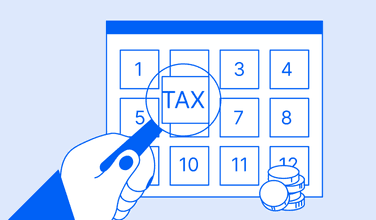Introduction to VAT Deregistration in the UK
Explore the intricacies of VAT deregistration in the UK: its benefits, eligibility criteria, impact, and reasons for deregistration. Get professional insights from Osome to navigate this complex process with ease.

Picture this: You're a business owner in the bustling city of London, navigating the complex world of VAT. You've recently heard whispers of something called VAT deregistration and you can't help but wonder what it's all about. Well, you're in luck!
In this article, we're going to dive deep into the ocean of VAT deregistration and explore its significance for businesses just like yours. So, grab a cuppa and let's get started!
VAT Deregistration and Its Significance for Businesses
Value Added Tax (VAT) deregistration is the process by which a business voluntarily cancels its VAT registration with HM Revenue and Customs (HMRC). Wondering why any business would want to do that? Well, it turns out that VAT deregistration can have a considerable impact on the way your business functions.
Let's delve deeper into the benefits of VAT deregistration:
- Potential reduction in administrative burdens — VAT returns, record keeping, and compliance can sometimes feel like juggling multiple flaming torches while riding a unicycle, especially for small businesses with limited resources. By deregistering, you free yourself from the never-ending VAT paperwork and can focus on other aspects of running your business.
- When a business is VAT registered, it is required to charge VAT on its sales and pay VAT on its purchases. This means that the business becomes a tax collector on behalf of the government. While this may seem like a straightforward process, it involves meticulous record keeping and regular submission of VAT returns to HMRC, not to mention the meticulous task of calculating VAT for each transaction. If you need help with the calculations, you can use this handy vat calculator.
- By deregistering for VAT, businesses can simplify their financial processes. They no longer have to worry about charging VAT on their sales or reclaiming VAT on their purchases. This can save valuable time and resources, allowing businesses to focus on core activities such as product development, marketing, and customer service.
- VAT deregistration can have a positive impact on cash flow. When a business is VAT registered, it needs to pay the VAT it collects from customers to HMRC on a regular basis. This can put a strain on the business's cash reserves, especially if there are fluctuations in sales or delays in customer payments. However, by deregistering for VAT, businesses can retain the VAT they collect from customers. This can provide a much-needed cash flow boost, allowing businesses to invest in growth opportunities or manage unforeseen expenses. It also eliminates the risk of incurring penalties or interest charges for late VAT payments.
It is important to note that VAT deregistration is not suitable for all businesses. For some, the benefits of deregistering may be outweighed by the potential loss of credibility or competitive advantage. VAT registration can provide a level of legitimacy and professionalism, especially for businesses that deal with larger corporate clients.
Additionally, deregistration may not be advisable for businesses that regularly make VATable purchases, as they would lose the ability to reclaim VAT on those expenses. Therefore, it is crucial for businesses to carefully evaluate their specific circumstances and consult with a tax advisor before making a decision.
Eligibility for VAT Deregistration
Now, you might be wondering if VAT deregistration is open to all businesses in the UK. The answer is a little more nuanced than a simple yes or no.
In general, a business can apply for VAT deregistration if their taxable turnover for the next twelve months is expected to be below the VAT deregistration threshold, which currently stands at £83,000. If your projected turnover is expected to fall below this magic number, you can consider bidding farewell to VAT. However, it's important to note that the deregistration threshold is not the only eligibility criteria. You must have paid or accounted for all VAT due, which can be verified through your certificate of good standing.
Criteria and Conditions for Being Eligible for VAT Deregistration
Before you start throwing confetti in the air, there are a few criteria and conditions that you need to meet to be eligible for VAT deregistration:
- You must have ceased making taxable supplies or have no intention of making taxable supplies in the future.
- You must have paid or accounted for all VAT due.
- You must have returned all goods and services that you claimed VAT back on to their original state.
It's important to carefully consider these criteria to ensure that your business truly meets the requirements before proceeding with the deregistration process.
5 Steps of the VAT Deregistration Process
So, you've ticked all the eligibility boxes, and now you're ready to embark on the VAT deregistration journey. But what does this journey entail? Embarking on the process of deregistration for VAT is a bit like setting off on a hike – it requires preparation, a clear path to follow, and of course, a fair bit of perseverance. Here are the five steps to set you off on the right track:
Check your eligibility to deregister
The first step in VAT deregistration is ensuring you are indeed eligible to take the plunge. As we mentioned earlier, your expected taxable turnover for the next twelve months must be below the VAT deregistration threshold of £83,000.
Complete the VAT deregistration form and submit to HMRC
The next step is all about completing your VAT deregistration form. You need to complete VAT Form 7, clearly stating your reason for deregistration and the date you want the deregistration of VAT to take effect.
Wait for HMRC to confirm your deregistration
Now it's time to kick back and wait. Once you've submitted the form, HMRC will review your application.
Keep all VAT records for 6 years
Upon reaching your deregistration milestone, you should keep all your VAT records for six years after deregistration.
Transfer your VAT registration to the new owner
Last but not least, if you're selling your business, you have the option to transfer your VAT registration to the new owner. It's important to ensure that the new owner has a unique business name, for which they can use the company name check tool.
While these steps may seem straightforward, it's always a good idea to consult with a tax advisor or visit the official HMRC website for detailed guidance tailored to your specific circumstances.
Impact of VAT Deregistration
VAT deregistration can have both positive and negative impacts on your business. On the one hand, you may experience reduced administrative burdens, a boost in financial flexibility, and the freedom to focus on growing your business without VAT-related constraints.
On the other hand, deregistration means that you won't be able to claim back VAT on purchases and could potentially lose customers who rely on reclaiming VAT when doing business with you.
It's crucial to carefully consider these factors and analyse how they align with your business goals and operations before deciding to deregister.
5 Reasons for VAT Deregistration
Now that we've explored the ins and outs of VAT deregistration, let's shine a light on some common reasons why businesses choose to take this path:
Your turnover has fallen below the VAT registration threshold
Businesses often choose VAT deregistration when their turnover dips below the VAT threshold deregistration limit of £83,000. This typically happens during a slowdown in business activities or a strategic shift towards smaller-scale operations.
You have ceased trading
If you're winding up or selling your business, then deregistration of VAT makes sense. It's a natural part of the journey's end.
You have been registered in error
There might be instances where businesses find they've been registered for VAT in error. In such a scenario, deregistering for VAT is the best route to take.
You no longer make taxable supplies
If your business shifts gears to provide goods or services that are exempt from VAT, then you might opt for VAT deregistration.
You have joined a VAT group
Sometimes, businesses that become part of a VAT group may choose to deregister, as the group handles VAT matters.
Simple As VAT
VAT deregistration can be a game-changer for businesses in the UK, offering calm amid the chaos of VAT compliance.
Before taking the leap, it's essential to carefully assess your eligibility, analyse the impact it will have on your business, and consider the underlying reasons driving your decision. The journey towards VAT deregistration may seem intimidating at first, but with the right professional guidance and understanding, you can navigate the process smoothly and embrace a newfound freedom in your business operations.







